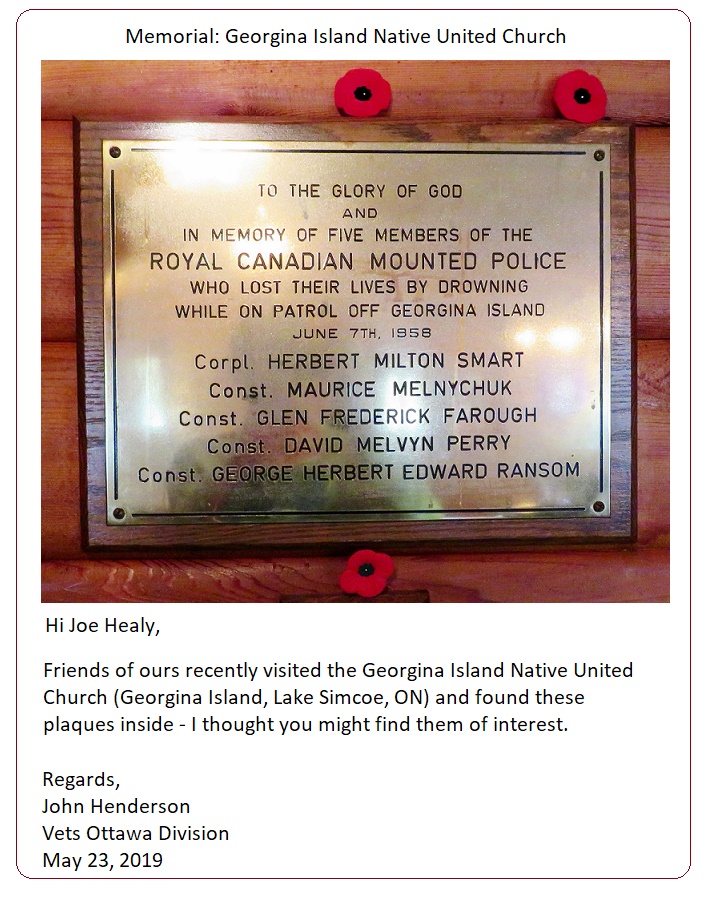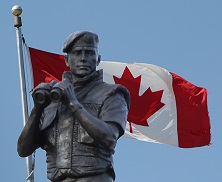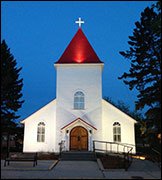True and Fascinating Canadian History

Lake Simcoe Memorial
near Jackson's Point on Lake Simcoe, ON
A Sad Date to Remember
The date June 08, 2008 marks the 50th Anniversary of a tragic day in the history of the RCMP. It was in 1958 that 5 members drowned near Jackson's Point on Lake Simcoe in Ontario.
Late in the evening of June 07, 1958 Cpl. Herbert Smart, Cpl. Maurice Melnychuk, Cst. Glen Farough, Cst. David Perry and Cst. George Ransom boarded a 14' RCMP outboard motor boat. According to Supt. John Thrasher, Commanding Officer in Toronto, the five members were on a routine patrol of the lake, but according to press reports the RCMP officers were understood at the time to have been going to check on illegal drinking and disorderly conduct reported at a wedding on Georgina Island Reserve.
It is known that after midnight that fateful night, a sudden and violent electrical storm swept across the lake. When the patrol was known to be missing, a search was undertaken. At mid-day on June 08, 1958 the police boat was discovered in the middle of the lake floating upside-down.
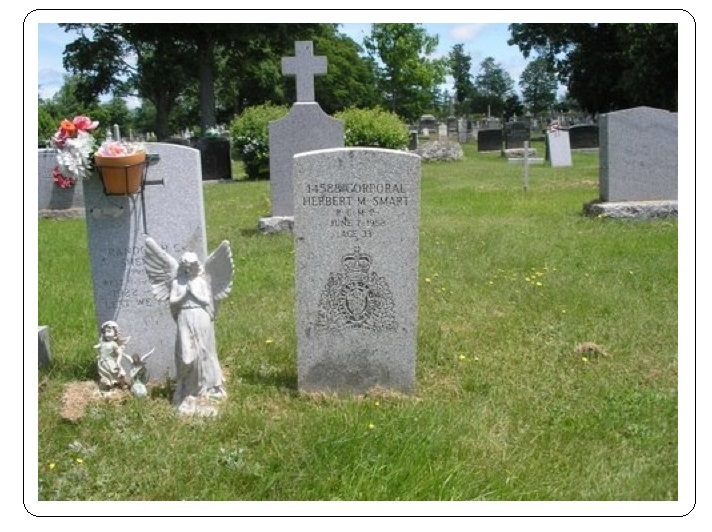
In the following days all five bodies of the members were found and recovered. It is speculated that the members were caught in this unexpected squall and that perhaps the boat was caught broadside and the officers were thrown into the lake. Whatever happened must have come without much warning, as although there were life jackets in the boat, they were not being worn.
Justice Minister Fulton spoke in the House of Commons on June 12, 1958. He told the Commons that no one will ever be able to say with certainty what caused the tragedy.
The RCMP at Toronto North Detachment held a 50 year Memorial Service at Newmarket, Ontario on Saturday, 07 June 2008.
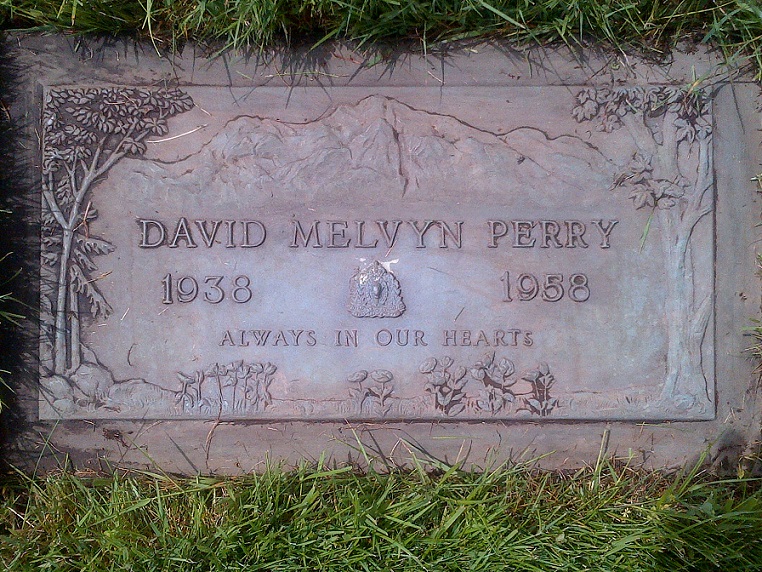
| Reg. # | Name | Cemetery | City and Province | Honour Roll |
| 14588 | Cpl. Herbert Smart | Maplewood Cemetery | Windsor, NS | #92 |
| 19469 | Cst. Maurice Melnychuk | Prince George Cemetery | Prince George, BC | #93 |
| 19478 | Cst. Glen Farough | Glenbow Cemetery | Stockton, MB | #94 |
| 19879 | Cst. David Perry | Forest Lawn Cemetery | North Burnaby, BC | #95 |
| 19915 | Cst. George Ransom | Melville Town Municipal Cemetery | Melville, SK | #96 |
Source: The Globe and Mail. Toronto. June 9 and June 12, 1958. Research undertaken at the University of New Brunswick Library,
Fredericton, NB. 2007.(JJH)
Commemorating the tragedy that history forgot
From: Friday's Globe and Mail
Published Friday, Jun. 06, 2008 5:08AM EDT
Last updated Monday, Mar. 30, 2009 3:50PM EDT
It was the largest single-incident loss of life in the 135-year history of the RCMP, which stretches from the skirmishes of the Northwest Rebellion to the slaying of four officers near Mayerthorpe, Alta.
But history has largely forgotten five officers who drowned 50 years ago this weekend on a stormy Lake Simcoe night in what should have been a routine patrol of the "dry" Georgina Island Indian Reserve. As with recent RCMP tragedies, the officers were young - four had less than two years of service - and the ensuing controversy reached Parliament Hill. The incident led to changes in Canada's boating regulations.
The RCMP will take a step toward rectifying the oversight with a ceremony at the Newmarket detachment tomorrow. Family members of the dead Mounties are expected to attend, along with the last living member from that ill-fated patrol on June 7, 1958.
The deaths still haunt Murray Smith, 69, now retired and living in Victoria Harbour, Ont. In a last-minute decision, Mr. Smith gave up his seat in the boat to another officer.
"I think about it an awful lot," Mr. Smith said. "I've had a lot of close calls but never that close. It makes cold chills go up your back."
Two weeks after graduating from training, Mr. Smith was part of a team patrolling the lake in a 14-foot, cedar-strip boat with a 35-horsepower outboard motor. The officers made several arrests for liquor infractions. After supper, the Mounties decided to make one more run from Paradise Beach, west of Jackson's Point.
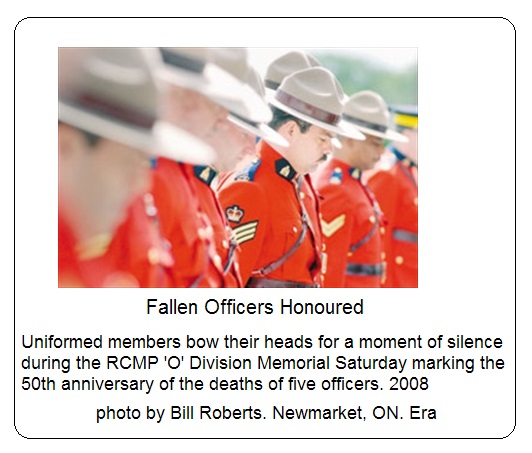
"I was in the boat, the motor was started and, for some reason, a member came down to the dock and walked right up to the boat and said, 'Smitty, you've been in the boat all afternoon, how about letting me go?' Well, it didn't matter to me, so I got out and he got in and I pushed the boat off and went back up and sat in the police car all night."
That was about 10:30 p.m., and the lake was calm. After midnight, "a hell of a storm" swept through the area. Mr. Smith and another Mountie, Ron McDonald, began to worry. "We kept saying, 'They'd be on land by now, they should be okay.' But we couldn't understand why they didn't call us on the radio."
Mr. Smith and Mr. McDonald went to a nearby marina for help. A search party headed out at first light, quickly finding the boat, submerged except for its bow, running lights still on. They also discovered the body of Corporal Herbert Smart, 33, of Toronto, the officer in charge. It was apparent he had been trying to get into a life jacket.
Constables Glen Farough, 22, of Stockton, Man., Maurice Melnychuk, 21, of Prince George, B.C., David Perry, 19, of North Burnaby, B.C. and George Ransom, 21, of Melville, Sask., were missing. All were good swimmers, but little hope was given for their survival. None was wearing a life jacket and the water temperature was determined to be 11 degrees on the surface and much colder a few feet down.
After the accident, justice minister Davie Fulton defended the RCMP in the House of Commons, saying all rules were followed, the boat had the necessary equipment and was not overloaded. However, a few days later it was brought to his attention that the maximum load for 14-foot boats was 740 pounds, and the five officers weighed a total of 860 pounds.
Within two weeks, before the lake had given up another body (all eventually were found), an inquest was under way at the town hall in Pefferlaw, Ont., newly painted for the occasion. It included a re-enactment of the patrol with five similar-sized men in the recovered boat. When the men jumped into the water, none of them could use the standard life jackets and cushions. The five-member jury concluded that the boat was likely swamped by 1.4-metre waves, perhaps when one of the fuel tanks ran dry. The jury also found the boat was overcrowded and overloaded, the standard life jackets and cushions were unsatisfactory in emergencies and the metal plaque listing the boat's capacity at 950 pounds was ambiguous.
RCMP officials testified they believed the weight to exclude the boat's motor, which weighed 129 pounds. Officials from the government, boat manufacturers and boating groups said the motor was included, although they agreed the wording was subject to different interpretations. The five RCMP officers also had about 100 pounds of equipment on board.
By the last day of June, Mr. Fulton had told the Commons he would implement the jury's recommendations, including new rules to clarify capacity. On July 1, the Transport Department announced new wording for load-warning plaques, making it clear the specified weight limit included everything in the boat, including motor, gear and people.
The RCMP announced it would set up a board to examine the risks of water patrols. A week later, the last body, that of Constable Ransom, washed up on shore.
A memorial service was held on Georgina Island that September. The incident then disappeared into history. Corporal Marc LaPorte, an RCMP media relations officer, said the initiative to mark the 50th anniversary came from the force retirees association.
"Why it took 50 years, I'm not sure," Cpl. LaPorte said. "Most people are unaware of it."
The event will begin at 11 a.m., when a plaque will be unveiled. Mr. Smith will be there, reading Psalm 46, which refers to troubled water. He is glad the deaths are finally receiving some recognition.
"We lost four members in Mayerthorpe, Alta., and the media picked up that that was the worst tragedy that had ever happened," Mr. Smith said.
"Although the four members were shot, I can't think of a more tragic death than drowning in ice-cold water in the middle of the night."
Mr. Smith spent 32 years in the RCMP, retiring as a staff sergeant from the Hamilton detachment. He has a son and daughter who are police officers.
In a final twist, Mr. Smith ended up being posted to Orillia to replace one of the dead officers, where one of his duties was patrolling Lake Simcoe. "I used that boat for the next two years," he said.
by Barry Ward
Special to The Globe and Mail
